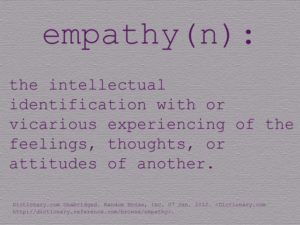
Photo Credit (unchanged): Crystal Coleman https://www.flickr.com/photos/thatgirlcrystal/6660793217
Required: Listening (as a start to empathy)
Three days after the inauguration and two days after the worldwide “women’s” marches, it is clear we are not listening to each other, instead, we are talking past or posting past each other on social media. Recent social media posts and comments wonder why there is a need to march or condemn those who are marching, while conveniently forgetting the protests with hateful, racist signs, acts of hanging and burning effigies after Obama’s elections. People misunderstand the reasons for marching by posting: “shut up and get over it, he won, you lost”, “give the man a chance, it’s only been one day”, “the signs with the p-word and pink hats are rude”. The latter ignoring the use of the p-word against him originated with the President himself, bragging about getting away with sexual assault because when you’re a star “you can do anything”. The President’s most ardent supporters broadly label the people that marched not just for women’s rights, but human rights as “liberal” which, seems to be an increasingly negative connotation.
Feeling Marginalized
There are multitudes of reasons why the minority of the popular vote, voted for our President, but let’s assume they were mainly economic reasons. The President gave voice to their fears and frustrations about stagnant wages, lack of job opportunities caused by unfair trade. They feel abandoned and invisible to the politicians in Washington and coastal elites. While doing so, The President denigrated and insulted what constitutes the majority of America’s voting population, which could explain his three-million-vote deficit in the popular vote. While he recognized a group of people who felt invisible, he focused his hatred and bigotry on people, who in a sense want to be invisible, who want to blend in and enjoy equality among us, regardless of race, gender, religion, or sexual orientation. Specifically, some marginalized groups may wish for the super power of invisibility to shield them from the systemic and institutional racism, not to mention the Presidents supporters’ blatant and perceived permission granted by him to verbalize their long simmering racist thoughts and actions.
The targeting of marginalized groups by our President has caused them to band together in solidarity. Not all people marching fall into a marginalized group, they are the fathers, sons, brothers, uncles and friends of the marginalized who are defending and advocating for their loved ones. Supporters of The President are part of the problem if they consider the people marching as sore losers and nothing more. While they may not be racist, bigoted or misogynistic, these supporters lack the empathy and understanding of other peoples’ lived experiences. To be fair, much of the population who voted against The President, do not understand the lived experiences of the people in rural America. Lack of empathy on all sides is at the heart of many issues we face as a country, but there is hope that we can learn from each other as we move forward looking for solutions that help everyone improve the quality of their lives.
Those who felt ignored and voted for The President because of what they thought he would do for them, may not realize they are only the newest folks to the marginalized bloc that started with the murder and displacement of The Native Americans. At various points in our history, Italian, Irish, Polish Americans, Jewish, and Catholics faced marginalization while Native Americans, African Americans, women, people with disabilities, and LGBTQ are still part of the marginalized bloc. We should not discount the people who feel left behind and voted for the candidate they thought represented their best interests. Their situations and feelings matter, but we cannot pretend they represent the majority of Americans.
Empathy
The time has come to listen to each other’s stories and struggles, have empathy for someone else’s situation and acknowledge that we all face trials and tribulations. By doing so, we may realize that others face bigger obstacles than we do. This realization does not necessarily minimize our own challenges; they are real and possibly represent the most difficult times we have had to face in our lives.
Perhaps the most important group that needs to practice empathy is white, heterosexual males. We have relatively few obstacles in our way. Working hard and sacrificing to provide for our families, some of us live a comfortable life. Being a white male, born and raised in a suburban zip code an hour or so from New York City, are factors alone that provided us an advantage over other people. Using running a marathon as a metaphor for our lives, as a white male, my starting line of life began running downhill. Others face an uphill start, with rain and an oncoming headwind based on the zip code they were born into, to parents they did not choose. We tend to think the life we are leading started from the same spot as everyone else, complete with the same opportunities throughout the marathon of life, but this far from reality.
Genetically Speaking, We’re 99.9% The Same
Reflecting on what actions we can take, it needs to start with treating each other with dignity and respect as fellow as human beings, recognizing that we share 99.9% of our DNA. The least we can do is listen, be open-minded, withhold judgement, and give each other the benefit of the doubt that we are all trying to lead healthy, happy lives. We can be curious about and listen to each other’s stories and lived experiences, putting our own advantages into perspective, and help others to do the same. Only when we imagine walking in another’s shoes, can we find out that what we have in common greatly outweighs our differences. We can then look for solutions and yes, compromises to support each other as decent and equal human beings.
The Sodina Project shares stories to foster connection and save lives. This grass-roots movement needs your help in connecting with others. If this blog or story moved you or made you reflective, please share it with your friends and social networks. You can use the sharing options at the end of each post .
Sodina | Voices to Stop Violence
#Sodina | #Voicestostopviolence








Leave a Comment